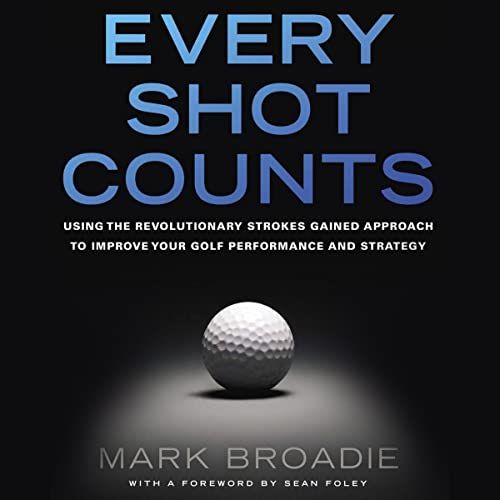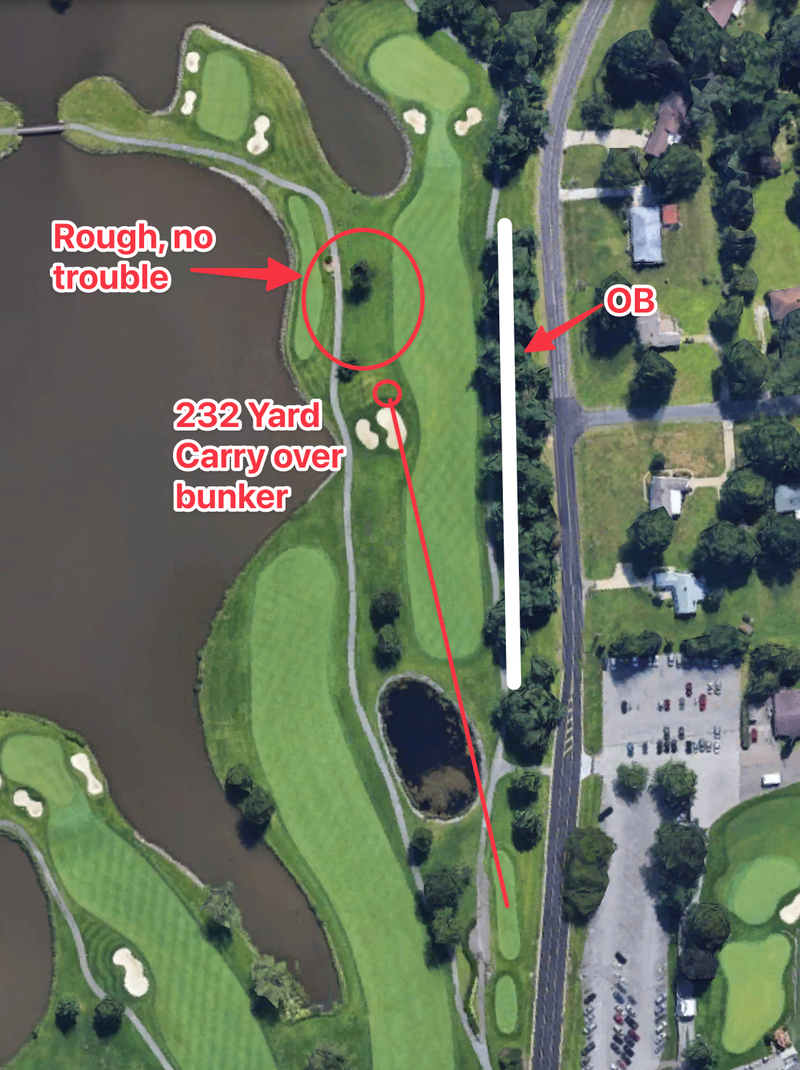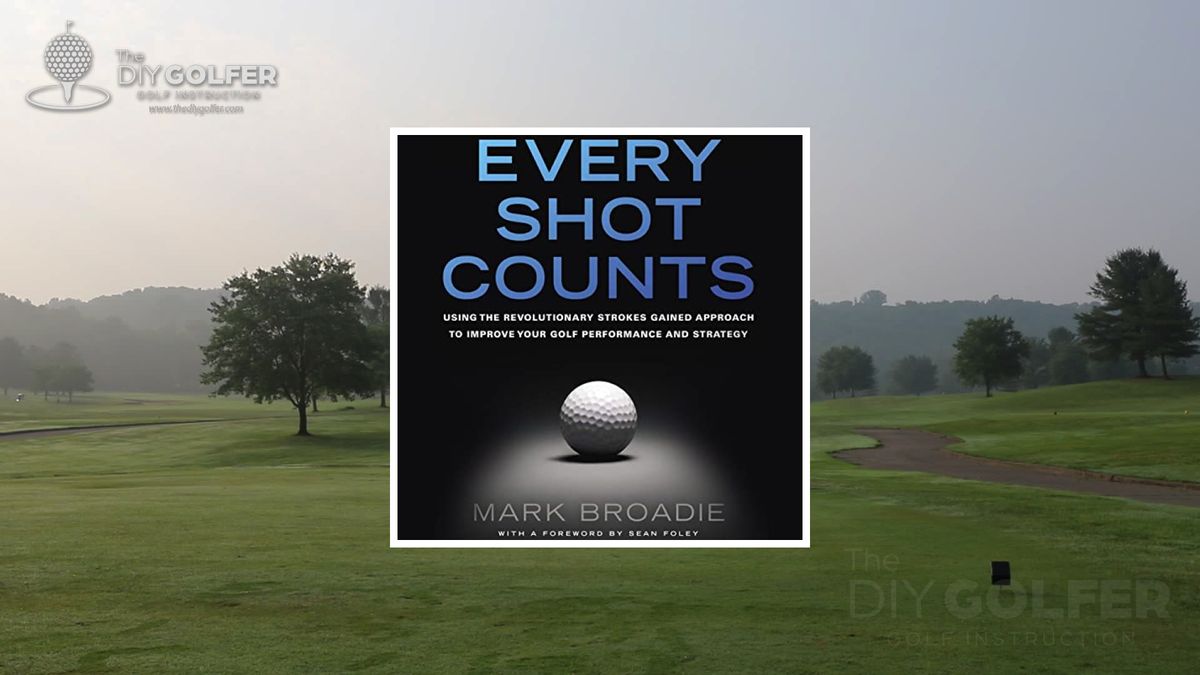
Overall Verdict
I highly recommend this product.
My favorite part about this book is how elegant, simple, and practical the strokes gained methodology is. We can finally put data behind our long-held assumptions of what makes a great golfer great.
Product detailsMy Rating
Pros and Cons
Pros
- Great overview of strokes gained
- Lots of practical examples
- Proves and disproves many golf myths
Cons
- Talks about putting too much for my liking
- Could have been shortened
Best for
Analytical GolfersThis product is best for analytical golfers who want to improve their game.
Product Features
My favorite feature
My favorite part about this book is how elegant, simple, and practical the strokes gained methodology is. We can finally put data behind our long-held assumptions of what makes a great golfer great.
Who is Mark Broadie?
The author of Every Shot Counts, Dr. Mark Broadie is not your average golf industry figure.
With a PhD from Stanford, Broadie is currently a professor at Columbia Business school and teaches various finance topics with a concentration in quantitative decision-making and risk management.
In other words, Broadie's specialty is using numbers to figure out how to make optimal, risk-managed decisions.
If you ask me, that sounds... A lot like what we do on the golf course.
Every Shot Counts Book Summary
Below is a summary of Every Shot Counts. This summary is not a chapter-by-chapter summary, but rather, an overview of the main topics covered in the book.
Topic #1: Why traditional golf statistics are broken
The book starts by outlining the problems of traditional golf statistics.
When I say "traditional golf statistics", I'm talking about statistics such as:
- Greens in regulation (GIR)
- Fairways hit percentage
- Putts per round
- Sand save percentage
These are the simplest statistics to track, but as Broadie outlines in Every Shot Counts, they lack context.
In the book, Broadie gives an example in a section called, "What is wrong with counting putts"? He writes:
Before the strokes gained putting stat, people used to count putts as a way of judging golfers' skill. They'd say, "If you want to be a better putter, chip it closer". This is nonsensical, since starting closer to the hole does not, in fact, improve your putting skill.
In other words, the total putts per round statistic is a better indication of how long your putts were rather than your skill at putting.
If you want a more detailed breakdown of why traditional stats are limited, I recommend checking out my post on what statistics you should track in golf.
Topic #2: What is the strokes gained approach?
As you might expect, in Every Shot Counts, Broadie offers us the antidote to these limitations—strokes gained.
In short, strokes gained is a way to measure relative golf performance.
It allows us to answer questions like:
- How well did Rickie Fowler putt during the Masters vs. the rest of the golfers who played?
- Over his entire career, what part of Tiger's game helped him the most in winning tournaments?
- On a windy day, how accurate were Justin Thomas's drives compared to the field?
- Who is the best putter on tour?
I won't go into detail here, but if you'd like sample calculations and a deeper dive on how strokes gained works, I recommend reading the book or checking out my strokes gained post.
Topic #3: Simulating golf performance and optimal strategy
After establishing what strokes gained is all about, Every Shot Counts dives into simulated data, which draws on Broadie's academic background in financial risk management.
Oftentimes when trying to determine the likely outcome of a stock portfolio, financial modelers will use Monte Carlo simulations to run thousands of market scenarios and determine the most likely returns of the portfolio.
We can apply this technique to golf.
Using average shot data from various distances and shot locations, we can run different skilled golfers through a Monte Carlo simulation to determine the most likely outcome given different strategies.
Broadie spends an entire chapter of this book explaining his methodology and demonstrating how various scenarios might play out.
For example, he simulates a golf match of a "Pro long / Am short" vs. "Pro short / Am long" scenario.
In this match, one team of golfers plays a scramble where the tour pro hits all shots > 100 yards while the amateur plays shots inside 100 yards. The competing group plays a scramble where the tour pro hits all shots inside 100 yards while the amateur plays shots > 100 yards.
While this scenario would be challenging to arrange in real life, with the help of simulations, we can make some interesting conclusions.
In every simulation, regardless of the amateur skill level, the group where the pro plays the long shots always wins! This means the long game is the biggest differentiator between amateurs and pros.
Topic #4: Practice drills to help your game
And finally, Broadie dedicates a few chapters explaining how the strokes gained methodology can help you make more strategic decisions and play higher probability golf shots. Additionally, he provides some practice games using strokes gained data to measure your improvement.
You can find drills and practice games like this on my golf drills page.
My Review of Every Shot Counts
Now that you have an overview of what the book is about, here is my take on it.
My Top 5 Takeaways
After reading Every Shot Counts, here are my top 5 takeaways. Please note, the book provides plenty of data to support these conclusions but I have omitted this to keep things short here.
Takeaway #1: The biggest difference between you and pros is the long-game
In Every Shot Counts, Broadie spends a lot of time on this topic. As I talked about in my newsletter on short game, the biggest difference between amateurs and pros is the long game.
While putting and short game is the quickest way to drop strokes from your score, it cannot make up for an inconsistent long game as you might have heard many golfers say.
Takeaway #2: Distance to the hole is what matters most
In nearly every scenario, being closer to the hole is more important than any other factor.
- The closer your putt, the more likely you are to make it (regardless of break, uphill, or downhill slopes)
- The closer you are on approach shots, the better
- For most golfers, laying up to a "full wedge" distance is less advantageous than hitting it as close to the hole as you can and having a partial wedge shot
- The further you drive the ball, the lower your score is on average
Now don't get me wrong—I could come up with hundreds of exceptions to these rules, but if you read into the data, you'll find these to be great rules of thumb if in doubt.
Takeaway #3: Work on 4-7 foot putts
The likelihood of making a putt outside 7 feet drastically drops for all skill level of golfers. Just take a look at the tour averages from 2003-2012:
| Distance (feet) | 1-Putt Probability |
|---|---|
| 2 | 99% |
| 3 | 96% |
| 4 | 88% |
| 5 | 77% |
| 6 | 66% |
| 7 | 58% |
| 8 | 50% |
| 9 | 45% |
| 10 | 40% |
While 20 and 30 foot putts might be fun to work on, 4-7 feet is where you'll make the money.
Takeaway #4: Avoid huge penalties by changing your target
Sounds a bit too good to be true right?
Well, take a look at the par 4 below and ask yourself—where would you aim your drive?

As I explain in my newsletter on 5 mental shifts you can make for your game, most golfers should be aiming left of the fairway.
Bet you never thought of doing that! But Broadie explains how accounting for the severity of penalties can help you formulate better strategy on the course.
Takeaway #5: Start tracking your stats!
If there's anything I took away from Every Shot Counts, it's this—every golfer needs to be tracking their stats.
While I've been a big advocate for stats tracking for a long time, I think shot tracking systems like Arccos which enable amateur golfers to benefit from strokes gained stats will be a big advancement for amateur golfers.
For years, amateur golfers had no way to benefit from strokes gained—remember, it's a relative measure of performance. In other words, without a database of averages to compare yourself against, there's no benefit to using it. But with new technology and shot-tracking ecosystems like Arccos, amateurs can now start to use strokes gained to their advantage.
My criticisms of Every Shot Counts
If you've been reading this site long enough, you know I'm a fan of analytics and data. I'm a software engineer by day, so you can't blame me for enjoying every minute of this book!
But I did have a few small criticisms that I'll share below.
Criticism #1: Not everything can be explained by data
As a former competitive college golfer, I've seen just about every golf scenario you can think of.
And sometimes, "trusting your gut" is the only way to play great golf.
In Every Shot Counts, I felt like Broadie did not acknowledge these factors enough.
For example, let's say you're on the last hole of a golf tournament. It's a narrow, 450-yard par 4 with OB right and water left.
Strokes gained data has a clear opinion of what club you should hit off this tee—rip driver!
But in this particular round, you've already tried hitting driver, and it's... Not working.
Every shot you've hit with the driver has gone sideways while every shot you've hit with the 3-wood has been straight down the middle.
While strokes gained would say that playing 3-wood off the tee gives you a smaller chance of making par than driver, you know in your "gut" that 3-wood gives you the best chance.
In this scenario, my play is a 3-wood because that's what I'm confident in on that given day. I don't care what the data tells me.
Criticism #2: Too much emphasis on putting
I understand why Broadie spent so much time on the topic of putting—it's vastly misunderstood.
But for my personal taste, too much of the book was about it.
Instead, I would have loved to see more data analysis on the long game.
Is Every Shot Counts worth reading?
If you are analytical and want a fresh approach to the game of golf, this book is for you! You'll walk away with a brand new perspective of the game and plenty of strategies to improve your on and off-course strategy.
